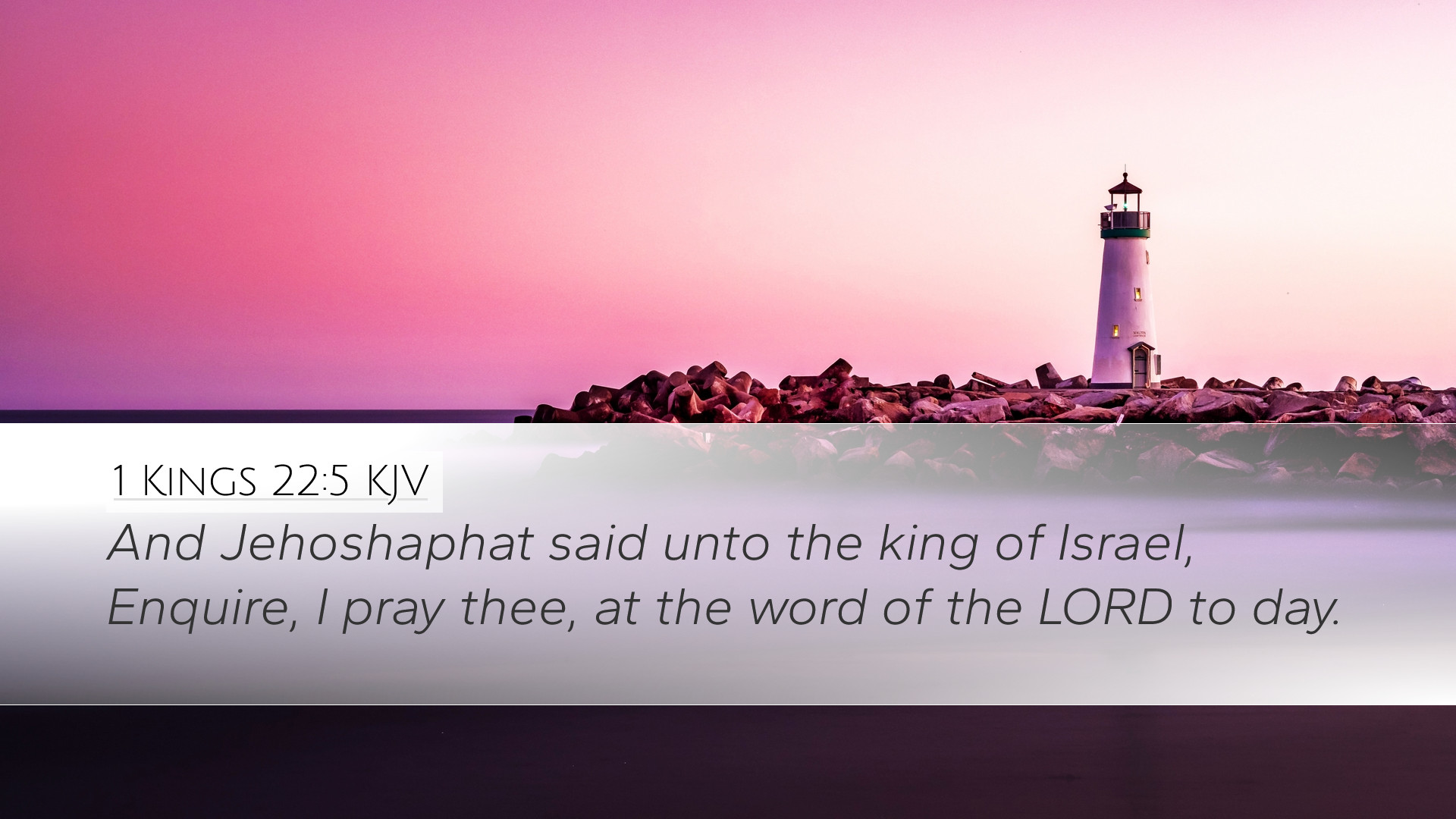Commentary on 1 Kings 22:5
Verse: 1 Kings 22:5 - "But Jehoshaphat said to the king of Israel, 'Inquire first for the word of the LORD.'
Introduction
The narrative in 1 Kings 22 serves as a crucial turning point in the history of Israel and Judah, manifesting the complexities of leadership, prophecy, and divine will. This segment finds itself in the context of political alliances and the prophetic voice of Micaiah, illuminating the character of both Jehoshaphat and Ahab as they navigate their respective spiritual and political landscapes.
The Importance of Seeking God's Word
As Jehoshaphat demonstrates, it is imperative to seek God's counsel before undertaking any significant venture. The phrase "Inquire first for the word of the LORD" indicates a priority that should be deeply ingrained in the hearts of all leaders, especially those who bear the responsibility of guiding God's people.
- Matthew Henry: Emphasizes that Jehoshaphat's insistence on consulting the prophet of the Lord is indicative of his piety and desire to align with God's will, contrasting with Ahab's penchant for false prophets.
- Albert Barnes: Notes that this inquiry reflects Jehoshaphat’s wisdom; he understood the significance of divine direction in matters of state, thus presenting a model for contemporary leaders who seek guidance.
- Adam Clarke: Points out that this verse illustrates a commitment to spiritual discernment over mere political maneuvering, suggesting that the foundation of all decisions must rest on the divine word.
Character Analysis: Jehoshaphat and Ahab
The dynamics between Jehoshaphat and Ahab provide a significant commentary on leadership styles and their repercussions:
- Jehoshaphat: A king esteemed for his reforms and dedication to Yahweh, Jehoshaphat’s approach contrasts sharply with Ahab's. His call to inquire of the Lord is a reflection of his faith and integrity.
- Ahab: Characterized by a willingness to compromise his spiritual integrity for political gain, Ahab illustrates the dangers of distant and superficial religious engagement.
The Role of Prophetic Voices
This scripture underscores the role of prophets in guiding and informing leadership decisions. The prophets serve as intermediaries who declare the divine will and often confront leaders with uncomfortable truths. Thus, it is vital to recognize:
- Trust in God’s revelation is paramount for leaders. Jehoshaphat's request symbolizes a heart willing to submit to divine authority.
- Prophets often faced rejection and hostility, as seen in Micaiah’s eventual treatment, showcasing the risks associated with proclaiming God’s truth.
- The importance of discerning true prophecies from false ones highlights the ongoing struggle within the community of faith to seek authenticity in spiritual matters.
Spiritual Leadership and Decision Making
This passage draws attention to the spiritual responsibilities of leaders. It not only encourages consultation of God's word but also demonstrates the broader implications of spiritual leadership:
- Reflection on Leadership: Leaders today are called to emulate Jehoshaphat’s desire for righteous counsel, recognizing the need for prayer and biblical guidance in every decision.
- Influence on Others: The nature of decision-making in leadership impacts the broader community; when leaders prioritize God’s word, they set a precedent that encourages a culture of prayer and reliance on God.
- Consequences of Ignoring God’s Guidance: The subsequent events in this chapter show the dire consequences of ignoring divine warnings and the tragic fate that can follow when leaders stray from seeking God’s will.
Conclusion
In summary, 1 Kings 22:5 not only serves as an invitation to inquire of the Lord but also stands as a reminder of the importance of spiritual integrity in leadership. Jehoshaphat’s example illuminates the necessity for all who aspire to lead, be they pastors, theologians, or any individuals in positions of influence, to prioritize God’s will above all. This scripture invites us into a dialogue about leadership, obedience, and the weight of prophetic truth, encouraging a community committed to seeking the heart of God.


